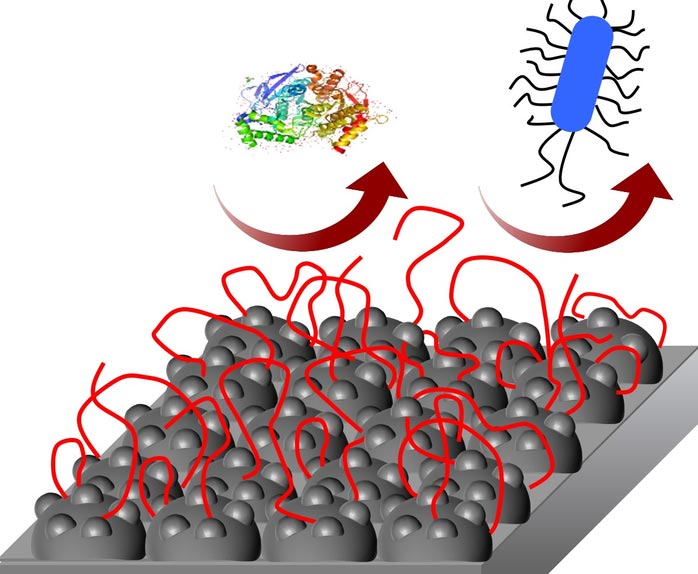Preventing infection with an improved silver coating for medical devices

A new type of silver coating (illustrated above) could prevent bacteria from adhering to medical devices.
Credit: Hossein Yazdani-Ahmadabadi
According to folklore, silver bullets kill werewolves, but in the real world, researchers want to harness this metal to fight another deadly foe: bacteria. Recently, scientists have tried to develop a silver coating for implantable medical devices to protect against infection, but they’ve had limited success. In a study in ACS Central Science, one team describes a new, long-acting silver-ion releasing coating that, in rats, prevents bacteria from adhering to implants and then kills them.
Sometimes medical care requires surgeons to implant a device, such as a tube to drain a wound or the bladder, or to deliver medication directly into the blood. However, bacteria can attach to and collect on the surfaces of these devices, creating a risk for dangerous infections. Researchers have been working to develop bacteria-repelling coatings, including those containing silver, which is known to kill microbes. However, their efforts have faced numerous challenges: Silver can also be toxic to human cells, and it’s difficult to make a coating that continually releases small amounts of the metal over long periods, for example. Dirk Lange and Jayachandran Kizhakkedathu wanted to identify a formula that could overcome these and other difficulties.
To develop a simple-to-use coating, the team screened many sets of ingredients that they could apply to a surface in a single step. The formula that worked the best included silver nitrate, dopamine and two hydrophilic polymers. This silver-based film-forming antibacterial engineered (“SAFE”) coating formed stable, silver-containing assemblies, which gradually released silver ions in lab tests.
When exposed over 28 days to eight of the most common species of bacteria that cause serious infections, this new coating recipe effectively kept the microbes at bay. It did so in a unique way: by both repelling the bacteria from the surface and then killing them with silver ions. To test SAFE’s effectiveness in a living animal, they coated a titanium implant with it, then placed the implant beneath the skin of rats. After a week, the researchers found that implants with the coating had dramatically fewer bacteria than those without it. In addition, there were no signs of toxicity to the rats’ tissues. The coating also appeared tough, showing little wear and tear after being rubbed and sterilized using harsh conditions. This combination of attributes is likely to make the coating useful in many types of medical devices and implants to prevent bacterial infection over the long-term, the researchers say.
The authors acknowledge funding from the Canadian Institutes of Health Research, the Natural Sciences and Engineering Council of Canada, the Canada Foundation for Innovation, the British Columbia Knowledge Development Fund and the Michael Smith Foundation for Health Research.
The paper’s abstract will be available on April 27 at 8 a.m. Eastern time here: http://pubs.acs.org/doi/abs/10.1021/acscentsci.1c01556 .
The American Chemical Society (ACS) is a nonprofit organization chartered by the U.S. Congress. ACS’ mission is to advance the broader chemistry enterprise and its practitioners for the benefit of Earth and all its people. The Society is a global leader in promoting excellence in science education and providing access to chemistry-related information and research through its multiple research solutions, peer-reviewed journals, scientific conferences, eBooks and weekly news periodical Chemical & Engineering News. ACS journals are among the most cited, most trusted and most read within the scientific literature; however, ACS itself does not conduct chemical research. As a leader in scientific information solutions, its CAS division partners with global innovators to accelerate breakthroughs by curating, connecting and analyzing the world’s scientific knowledge. ACS’ main offices are in Washington, D.C., and Columbus, Ohio.
To automatically receive news releases from the American Chemical Society, contact newsroom@acs.org.
Journal: ACS Central Science
DOI: 10.1021/acscentsci.1c01556
Article Title: Durable Surfaces from Film-forming Silver Assemblies for Long-term Zero Bacterial Adhesion without Toxicity
Article Publication Date: 27-Apr-2022
Media Contact
Katie Cottingham
American Chemical Society
k_cottingham@acs.org
Office: 301-775-8455
All latest news from the category: Medical Engineering
The development of medical equipment, products and technical procedures is characterized by high research and development costs in a variety of fields related to the study of human medicine.
innovations-report provides informative and stimulating reports and articles on topics ranging from imaging processes, cell and tissue techniques, optical techniques, implants, orthopedic aids, clinical and medical office equipment, dialysis systems and x-ray/radiation monitoring devices to endoscopy, ultrasound, surgical techniques, and dental materials.
Newest articles

Innovative 3D printed scaffolds offer new hope for bone healing
Researchers at the Institute for Bioengineering of Catalonia have developed novel 3D printed PLA-CaP scaffolds that promote blood vessel formation, ensuring better healing and regeneration of bone tissue. Bone is…

The surprising role of gut infection in Alzheimer’s disease
ASU- and Banner Alzheimer’s Institute-led study implicates link between a common virus and the disease, which travels from the gut to the brain and may be a target for antiviral…

Molecular gardening: New enzymes discovered for protein modification pruning
How deubiquitinases USP53 and USP54 cleave long polyubiquitin chains and how the former is linked to liver disease in children. Deubiquitinases (DUBs) are enzymes used by cells to trim protein…



